Foundation for Rural & Regional Renewal (FRRR)
In this quarter’s update for FRRR’s donor partners, read about:
- Grants in Action: Sitting together and speaking up in WA’s mid-west
- Partnering Opportunity – Building resilience to drought
- Donor Spotlight: Thankful4Farmers
- Insights from the bush
- Community Partner Spotlight: Foundation Barossa
- Our progress, with your support
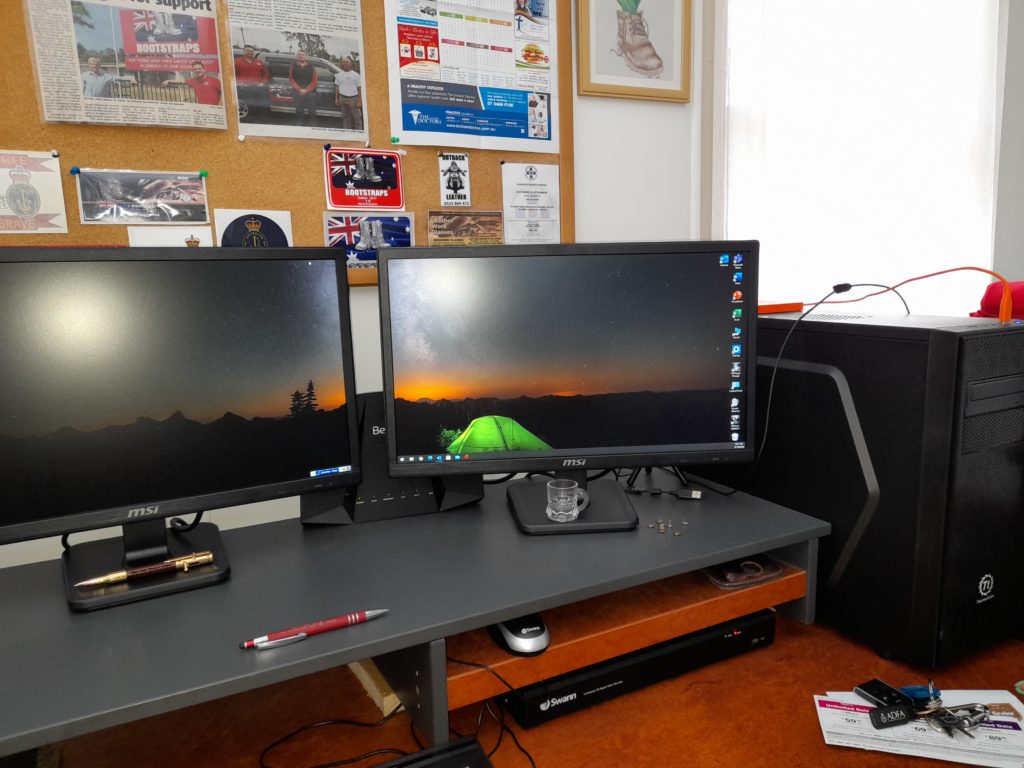
An innovative program drawing on the personal experience of its founder’s family is making an impact on veterans and current service personnel in Queensland’s Lockyer Valley.
Bootstraps is a volunteer-operated charity that runs a drop-in recovery centre for former service personnel who may be having difficulties connecting with family or society at large. Given the proximity of the RAAF Base at Amberley, Army Aviation at Oakey and Signals Regiment at Cabarlah, and with RSL Sub-Branches dotted through the Lockyer Valley, the organisation is well-located to offer this support.
President and founder of Bootstraps, Sam Kavanagh, was taught leatherworking by his father, who was in the air force and practised this craft as a kind of therapy. Building on this, as part of its offering, Bootstraps runs a leatherworking program to facilitate reconnection and social interaction. Ex-service personnel, current serving personnel and their families take priority, but space allowing, the program is open is open to anyone in the community.
The organisation needed some equipment to deliver the program and applied to FRRR for funding for an industrial leather sewing machine and a new computer, which they received in the form of a $5,407 Strengthening Rural Communities grant, funded by The Sylvia & Charles Viertel Charitable Foundation.
The computer replaced a small inefficient laptop and enhances the organisation’s day-to-day communications and planning, while the sewing machine supports every level of the Bootstraps leatherwork training program. The model chosen is capable of being hand-cranked, which facilitates use by veterans with lower limb disabilities in particular, and those confined to a wheelchair.
The grant application noted, “There are not many (if any) families in the Lockyer Valley that do not have a military and/or a horse connection that could benefit from the leatherwork activities run by Bootstraps.”
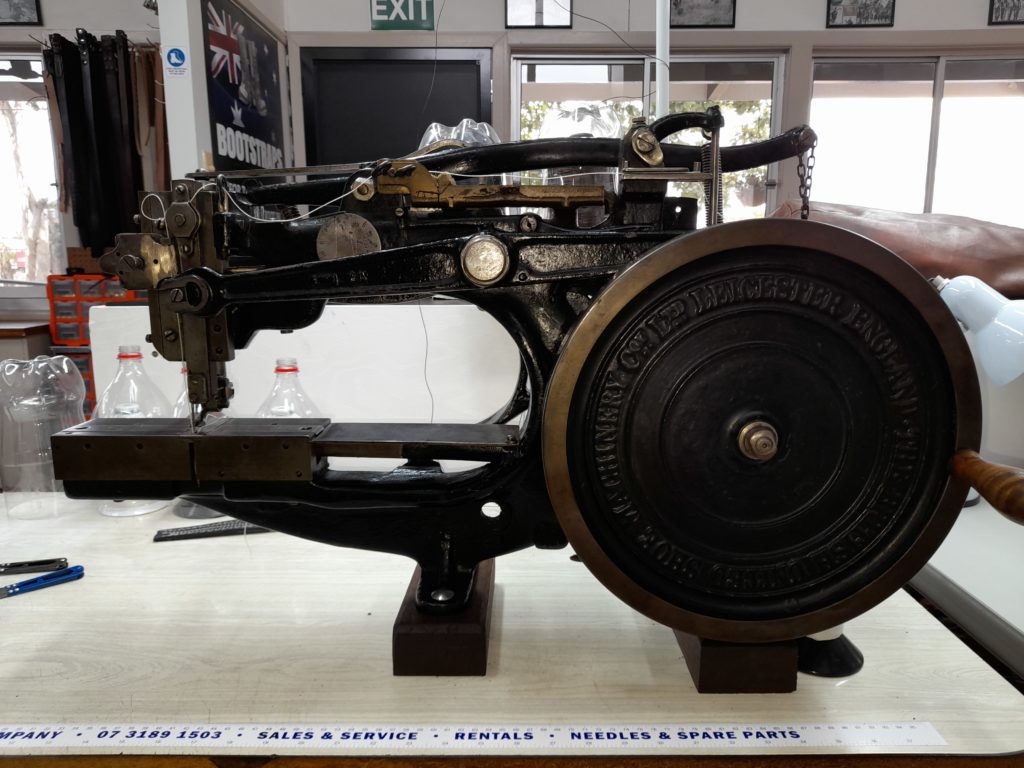
At the time of reporting, Bootstraps noted that more than 250 patrons have used the Bootstraps facilities, including the new leather sewing machine. The new IT facilities have meant better access and clearer information is available to the public about the program, via a more responsive and efficient website and communications.
These important pieces of equipment will help the program’s participants further their craft, while enabling social connection and helping veterans and the general community remain in a good head-space.
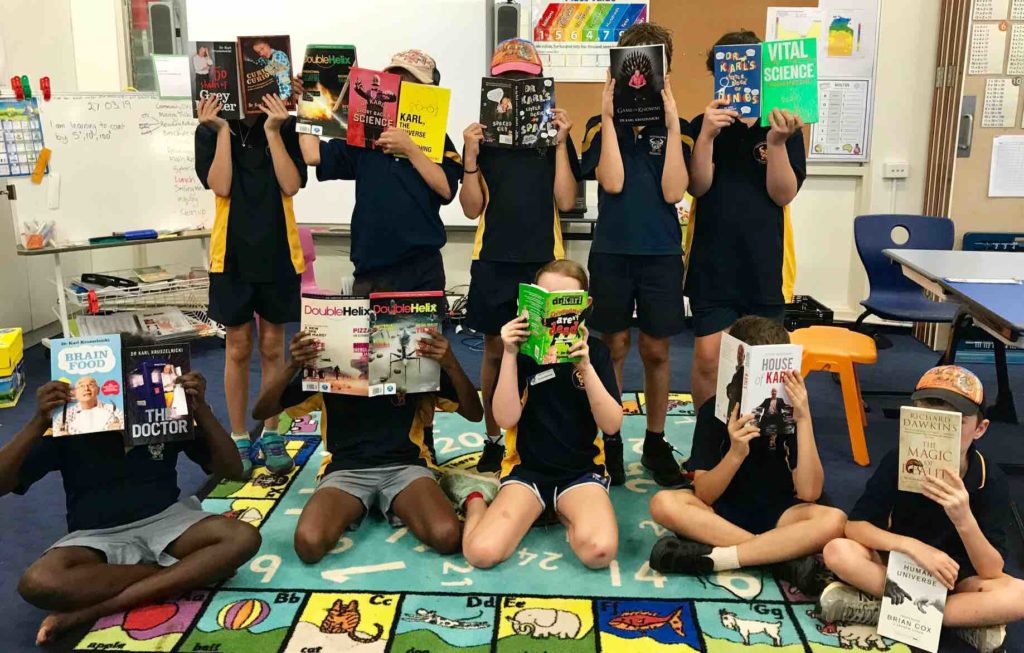
Did you know that some schools in remote Australian communities might have as few as 15 books in their library?
That discovery in 2017 prompted Corey Tutt to start sourcing and supplying resources himself, initially from his personal library. DeadlyScience Limited was established in 2020, and is now a registered charity. Through DeadlyScience, Corey is seeking to inspire a new generation of scientists.
It focuses on providing Science, Technology, Engineering, and Mathematics (STEM) and early learning reading resources to remote Australian schools to help increase engagement.
The initial priority is schools with a high proportion of Indigenous children. Where possible, and appropriate, DeadlyScience sources materials from Indigenous authors, artists, and translated versions in Indigenous languages. In the three and a bit years since inception, DeadlyScience has had more than 110 schools requesting resources.
They have delivered more than 16,000 books, 500 telescopes (and basic science kits), 80 educational resources and six greenhouses (plus seeds, and educational materials to support food production projects) to more than 100 Australian schools and/or communities.
This growth looks set to continue as the organisation gains more momentum and profile. Another key activity involves maintaining a website to support teachers in remote schools with access to high quality scientific research and relevant experts in their fields (also of Indigenous background, where possible).
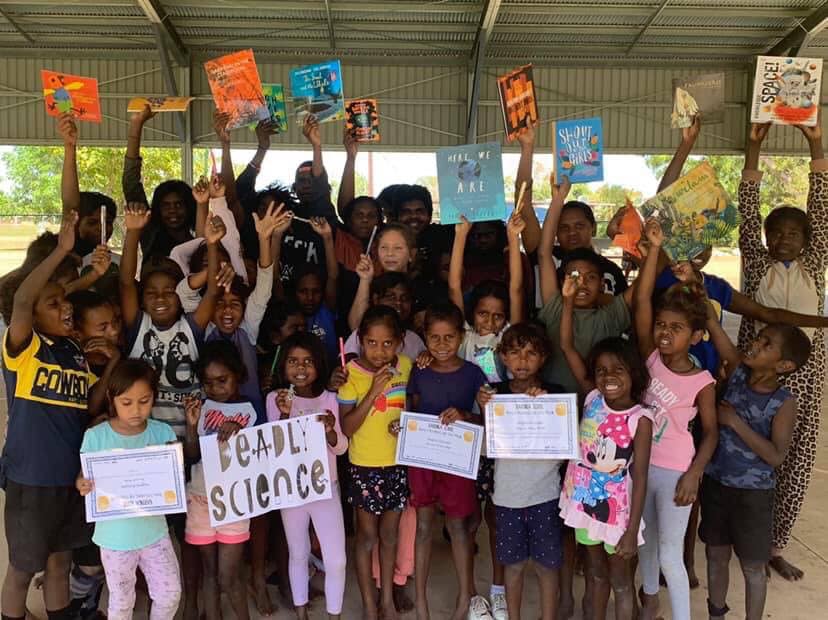
In 2020, DeadlyScience partnered with FRRR to set up a Not-for-Profit Fundraising Account, allowing them to attract tax deductible contributions from a broad range of donors to expand their activities and support the overall capacity and operations.
You can add your support by donate securely online, or check out the DeadlyScience website to learn more about their work.
To learn more about opening a Not-For-Profit fundraising account, get in touch with Jo Kemp.
About 70 km north of Roma, in Queensland’s Maranoa district, there is a crossroad, a place that most people pass by. It’s not a barren area – it has its own sense of beauty, but it is not an easy place to live either. It’s known as Roughlie.
In the five years from 2014, this small part of the world experienced pretty much everything the elements could throw at it. They endured floods, fires, severe drought conditions and decreasing commodity prices. But they are a resilient bunch of people.
During these hardships, two farmers – a husband and wife team – offered a parcel of their land to the community for the purpose of establishing a not-for-profit community centre.
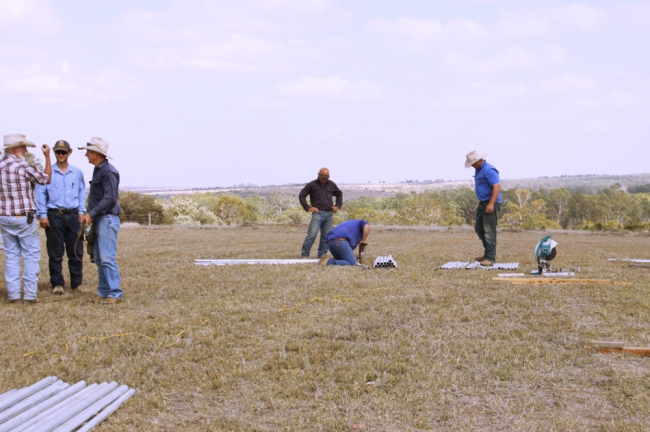
As Lexene Spreadborough, Treasurer of Roughlie Community Centre explains, they saw a need to have a place where the community could come together for physical, emotional and mental wellbeing through social interaction and community involvement.
“[We needed] a place for members of our community and district to come together for mental and moral support is vital during droughts. A community space allows drought-affected farmers and graziers to support each other – improving community connectivity and in turn build a stronger community.
“The Roughlie Community Centre Inc. was established in July 2014, and by the October we had 40 members forming the working committee. All members and the community were volunteers with no paid staff.
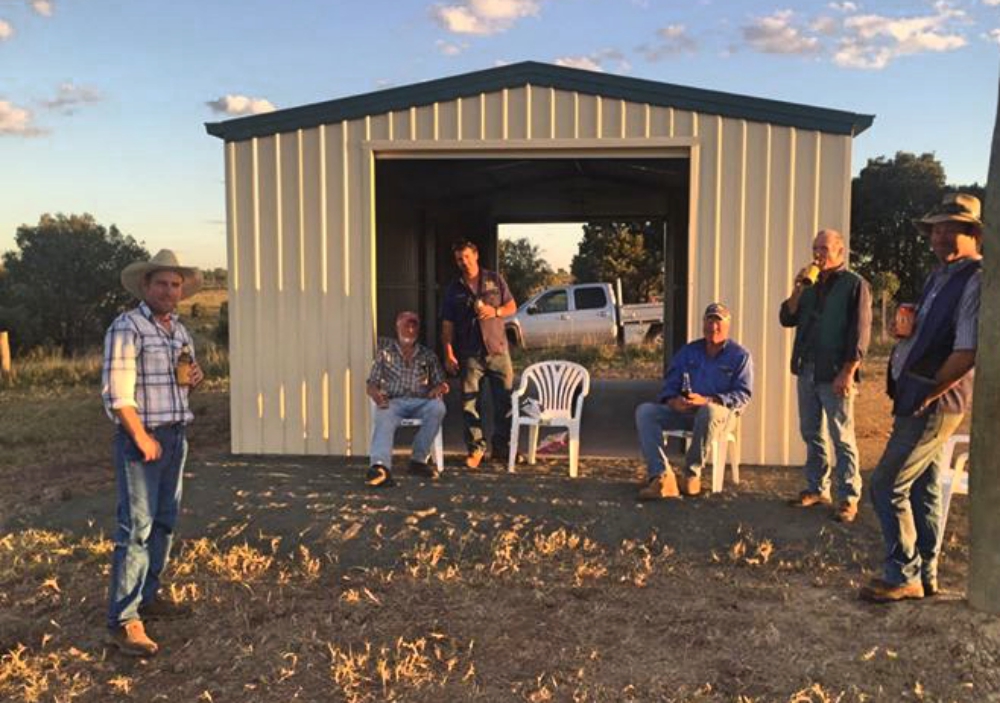
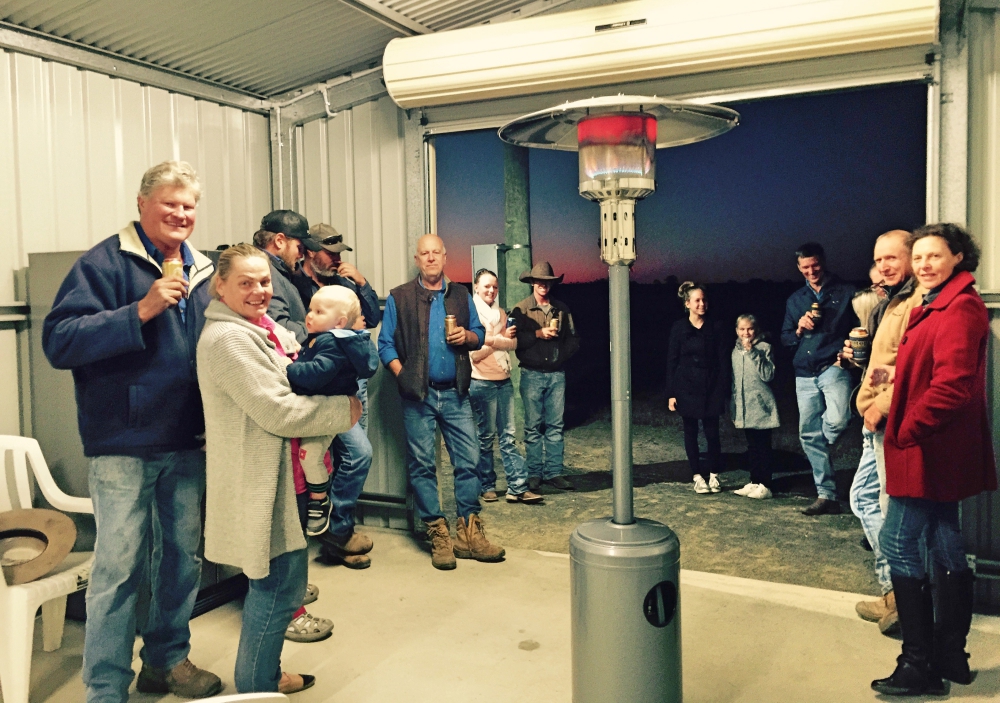
“Our vision was to have a centre to be used for social functions, sporting and recreational activities and to provide a venue for industry groups for workshops, seminars and field days. But we needed somewhere to meet, as there was no community meeting place in our district,” said Ms Spreadborough.
The ‘It started with a Shed’ project was borne, as part of the first stage in their shared vision.
“We received a $9,990 grant through FRRR’s Tackling Tough Times Together program to build a Shed for the community to come together to fundraise and plan the centre. The money, which we know came from the Tim Fairfax Family Foundation, was a catalyst for further funds, with substantial additional donations being made to connect the power, install a rain tank, a BBQ and stainless-steel benches. Another successful application to the Maranoa Regional Council’s ‘Community Grant’ program provided half the cost of fencing of the land, with the remainder being funded by members and residents. And we’ve gone on from there, since securing other grants and we now have a new Community Centre.
“The Shed – the first building on our land – started it all. It’s led to families coming together to connect with other members of our district. We have held card afternoons, club meetings, theme nights and other events. Before this some people had very little social interaction.”
Kara Spreadborough works as a Clinical Nurse Consultant at the local hospital. She has a young family, and to her, the Shed offers a special place of connection and sense of community.
“[In my role], I see the importance of that interaction and connection for the community, so I provided a letter of support just to say that working in the outback for the last 8 years, I’ve seen the importance of coming together as a community and the mental health aspect of it. Just sharing stories, sharing a cuppa, really does help people process things, because there’s that aspect of people being a bit more lonely, a bit more isolated in the bush.
“The whole process of applying for the grant was seamless. Although these things seem daunting, once you get going and talking to people… And the fact that we got what we asked for, we were blown away, but we were so appreciative. Doing this for the community, people would stop us in the street and say how amazing it was that we got this building, because it is amazing.”
Lexene Spreadborough said that while they’ve only just started using it, they have had a lot of people enquiring about it now, but mostly for workshops, seminars, information and industry-related training days.
“It’s also used socially for anyone in the district, sometimes we have a Friday night get together here, we have our meetings here, rural fire brigades have their meetings here, and Anglicare has a monthly children’s playgroup,” she said.
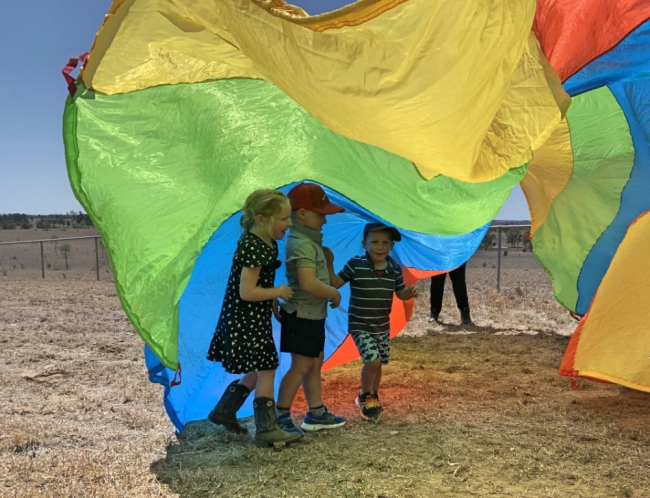
President of the Roughlie Community Center, John Frith, said, “I think it’s a real positive to the area to bring people together more regularly, and the guys obviously share similar challenges and successes. They can get together more regularly than they otherwise would with this facility here, which I think is important on two fronts; socially, and the potential to bring industry forums to the actual doorstep.”
And while the finishing touches to the Community Centre were only made in December 2020, the venue has already hosted a number of community gatherings, and a workshop is scheduled in July for community members to gain an understanding of soil carbon sequestration practices to mitigate climate change and move towards better land management and agricultural practices.
Storytelling is a vital part of Aboriginal and Torres Strait Islander culture, allowing beliefs and concepts to be passed on through generations. JUTE Theatre Company (JUTE) uses theatre performance and workshop participation to present professional role models and positive stories about a range of Indigenous experiences and possible futures.
Founded in Cairns in 1992, JUTE helps Indigenous students feel valued and connected, by letting them see their cultures and stories represented on stage. There are also longer-term benefits in employment and post-school options for young Indigenous people. Since the beginning of its Dare to Dream program, JUTE has impacted over 6,000 young people and community members in remote parts of North Queensland with more than 3,600 young people taking part in skills development workshops.
With the support of a $15,000 ANZ Seeds of Renewal grant, JUTE was able to take its 2019 show, The Longest Minute, to 10 North Queensland schools in Lockhart River, Bamaga, Mapoon, Mossman, Ravenshoe, Yarrabah, Mt Isa, Doomadgee and Cloncurry – all very remote locations with significant numbers of Indigenous students. The Longest Minute is a story about the 2015 National Rugby League Grand Final, won by local heroes, North Queensland Cowboys in a nail-biting finish.
The funding helped JUTE refine its school program to meet a broad range of needs across artists and facilitators, community, schools and students.
“It was fantastic,” said one of the Mapoon teachers. “The acting was incredible, and it offered our students an opportunity to see successful Indigenous people who are proud of their identity performing at their best. This is something we don’t have easy access to, being so remote.”
Schools are an important place for building cultural and environmental connections, and Gondwana Link Ltd realised that enhanced learning could only come from a curriculum relevant to the local context. Some of the schools and staff in the Gondwana Link region (1,000 km of south Western Australia) had no exposure to the culture of Indigenous Australians, and therefore teaching lessons with an Aboriginal perspective was very difficult for them.
The FRRR ANZ Seeds of Renewal grant program supported the Nowanup ‘Bush University’ Schools Program with a $12,500 grant for professional development for teachers and staff, deepening cross-cultural awareness and building Noongar language and cultural activities into the Australian National Curriculum.
Gondwana Link Ltd used the grant to engage Noongar Elder, Eugene Eades, and an education consultant to develop and implement a trial Professional Development opportunity for teachers and support staff from local primary schools.
Professional development was provided for 20 teachers and support staff within the Gondwana Link region in the format of a two-day Camp-on-Country at Nowanup.
The intention of this program was two-fold:
- To enable educators from the surrounding regions to develop a better appreciation of local Noongar cultural and heritage values, and to deepen their understanding of Noongar perspectives on management of the land, or Boodja, in the context of contemporary sustainable land restoration as practiced at Nowanup and throughout the Gondwana Link project.
- To have schools actively commit to improving their policies and procedures to be more responsive to Noongar cultural frameworks, thus presenting the ‘Indigenous content’ of the Australian Curriculum in a manner sensitive to the local Noongar context, and also better engaging with the local Noongar community.
The funding enabled two such camps to be designed, implemented and reviewed, and Gondwana Link Ltd now has a viable model to work from to move forward with future camps. The feedback was extremely positive and will also contribute to planning for the next series of professional development camps.
“I have learnt many things about the Noongar culture that I did not know. Their connection to the land is pivotal in their lives and spirit. This has made me think about my own connection to the land and how I can incorporate this into my classroom. I have found the inspirational stories of past teachers interesting and am constantly thinking about things I can change or incorporate to ‘make a difference’ to the students in my class.”
“I learnt an appreciation of the importance of incorporating local knowledge (both Noongar & white culture) into the curriculum.”
“I feel so privileged to be able to participate in such an incredible camp. I loved all of it but particularly the music and the stories. Seeing all the amazing things that are happening out here is so inspiring and beautiful, and I hope to be more involved in future. I really enjoyed seeing the breakaways and the artefacts and some of the beautiful places out here.”

